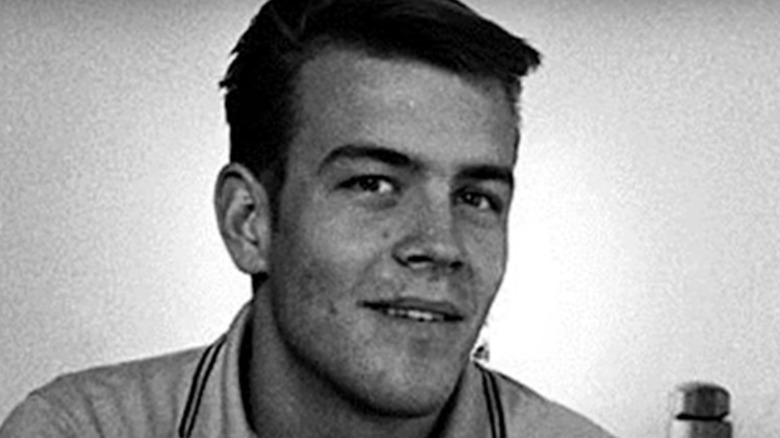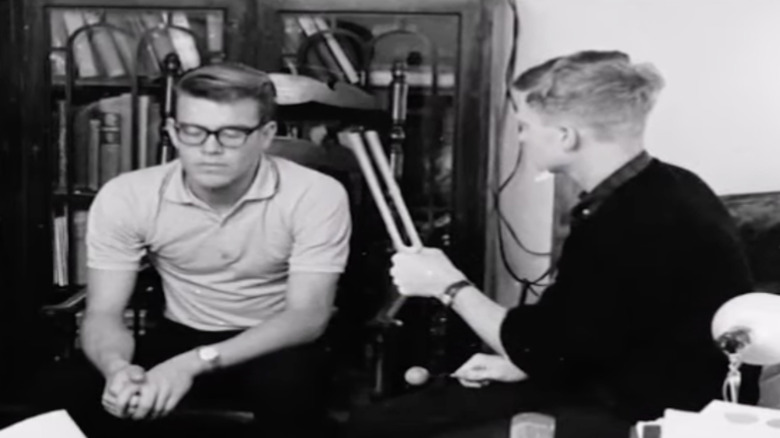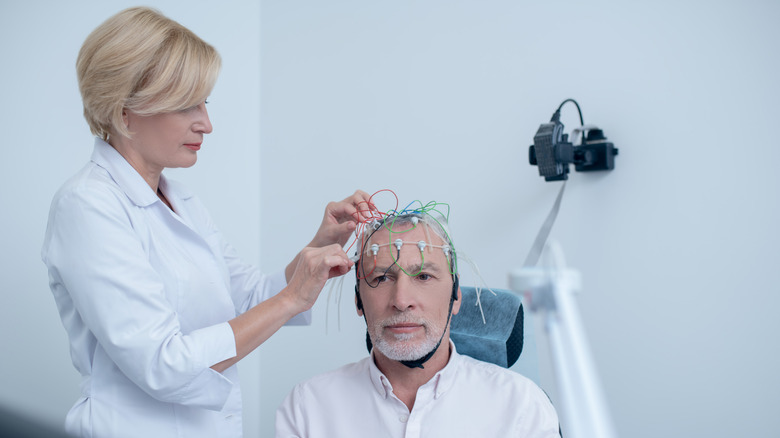The Fascinating True Story Of The Boy Who Stayed Awake For 11 Days
In December 1963, two San Diego teenagers named Randy Gardner (pictured above) and Bruce McAllister had been cooking up an idea for their high school science fair project. They settled on seeing how long one of them could stay awake, while the other would record any side effects of the sleeplessness. The pair also had an eye on breaking the world record for staying awake. At the time, it was held by a DJ in Honolulu, who had gone 260 hours without sleep. "[The] first version of it was [to explore] the effect of sleeplessness on paranormal ability," McAllister told the BBC in 2018. "We realized there was no way we could do that and so we decided on the effect of sleep deprivation on cognitive abilities, performance on the basketball court. Whatever we could come up with."
After Gardner lost a coin toss, it was determined that he would be the subject to go without sleep. After two days of being kept awake, some effects began to surface. He had difficulty focusing his eyes and trouble with certain words in tongue-twisters. But the real problem with the study is that McAllister also started falling asleep. "We were idiots, you know young idiots," he said, adding, "and I stayed awake with him to monitor him ... and after three night of sleeplessness myself I woke up tipped against the wall writing notes on the wall itself." The two quickly realized they needed a third person and recruited classmate Joe Marciano.
The science fair project gains national attention
The amateur study by three high school students began to make the news and caught the attention of U.S. Navy medic Lieutenant Commander John J. Ross and Stanford University sleep researcher William Dement. Sleep science was a nascent field at the time, and it was considered by many to be a dangerous area to study because of the potential damage to sleep study subjects. "I was probably the only person on the planet at the time who had actually done sleep research," Dement told the BBC. "[Randy's parents] were very worried that this might be something that would really be harmful to him. Because the question was still unresolved on whether or not if you go without sleep long enough you will die."
By day three, Ross noticed that Gardner had trouble controlling his emotions and wild mood swings. Hallucinations began after five days. During the day, Gardner played basketball and pinball with his fellow students, which was much easier than trying to stay awake at night. They tested his sense of hearing, smell and taste. The observers noted that his cognitive and sensory abilities were affected. "I mean, it was crazy, where you couldn't remember things, it was almost like an early Alzheimer's thing brought on by lack of sleep," Gardner told NPR in 2017. He ultimately stayed awake for 264.4 hours — 11 entire days — ending on January 8, 1964.
The catnapping brain
You'd think after beating the world record, the first thing Gardner would want to do is hit the sack. But first he had to give a press conference about the entire adventure. And then he was taken to a hospital so doctors could conduct an EEG and study his brainwaves. It was only then that he was allowed to sleep, which he did for 14 hours. Gardner was at school the next morning, seemingly experiencing no effects of going without sleep for a week-and-a-half, according to Men's Health. The results from Gardner's tests came back concluding that his brain had been catnapping the entire time. That meant that parts of his brain could catnap and restore while other parts of his brain would be the driving force in whatever activity was in front of him, a finding later verified by the National Institutes of Health.
Others have reportedly beaten Gardner's time in the decades that passed, but Guinness World Records stopped certifying these attempts out of fear that record-seekers would damage their health. In 2017, Gardner said he had been suffering insomnia for about 10 years, and that he believed it's a bit of karma, telling NPR: "That's why I keep calling this some karmic payback for, you know, my body going, OK, buddy. Yeah, OK, 11 days without sleep when you know damn well you need sleep? Well, let's try this out for size." He eventually overcame the insomnia, but still was only able to sleep for about six hours a night, said NPR.


